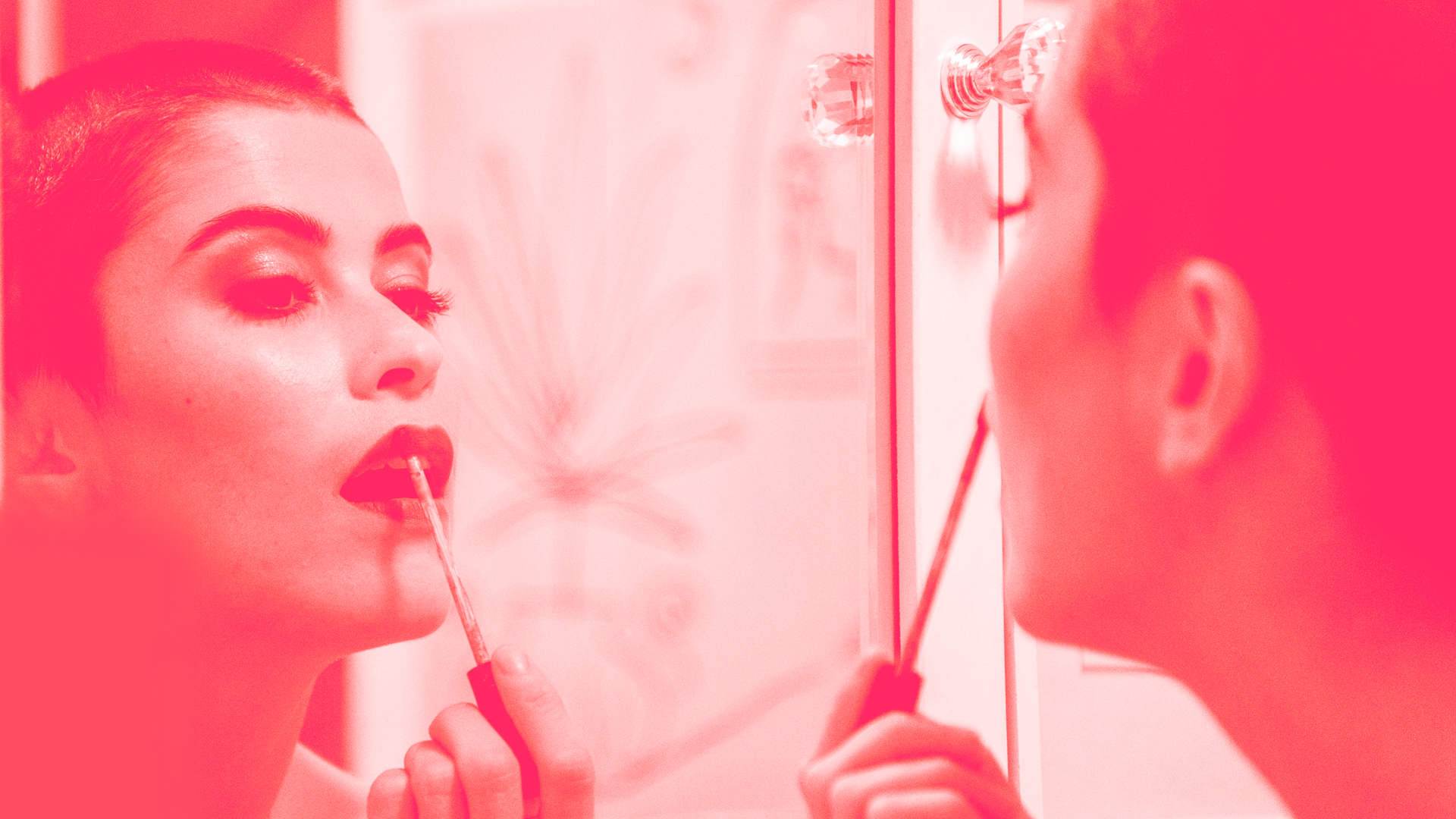Am I Shallow for Caring About My Appearance?
Surely there are more important things.
by Sophie K Rosa
20 August 2025

In a society that puts profit before people, it’s hard not to feel broken-hearted. Landlords split friends, nuclear families isolate parents, bosses burn out workers. But fear not – Red Flags is here to tend to your troubled hearts.
In Novara Media’s anti-capitalist anti-advice column, resident therapist Sophie K Rosa marries their ongoing training in psychoanalysis with ideas from their book, Radical Intimacy, to respond to your questions. Unlike other agony aunts, Sophie doesn’t claim to have all the answers, but they could help you unlock new ways of thinking.
To submit a dilemma to Sophie, please fill out this form.
Dear Sophie,
I am 25 and stuck in the same self-confidence swamp I spent most of my teenage years in. I was a happy and hairy girl (at least, before my thumb sucking habit forever shaped my front teeth). Then I became a teenager. Everyone goes through awkward years, but mine never ended.
Wanting to look good often feels superficial to me (especially when compared to much bigger things that perhaps explain why I feel paused in these moments), but if I’m honest with myself, it is one of my deepest-rooted struggles – and the longer I shrug off the issue or deny its existence, the more I see it affect my relationship, my friendships and my wellbeing.
I have never connected very strongly to things that feel feminine, and my body has developed in ways that I don’t feel resonate with. I’ve never learned to use skincare or make-up or how to do my hair, and part of me is resistant to learning. My politics, especially my environmental concern and cynicism about the fashion and beauty industry, mean I judge myself for wanting to buy things to improve my appearance. I don’t know if I can simply, or should, reject the aesthetics of capitalism until confidence bursts from me.
I see lots of people I aspire to, people with incredible hearts and minds, expressing themselves through their appearance. Part of me knows there is a way to combine my principles with a concern for how I look, but I am struggling to figure it out. Struggling to understand that it’s normal to want to feel good about yourself, feel connected to the idea you have of yourself in your mind, to feel desired in your relationships, and to show yourself effort and commitment to looking after yourself. Have you managed to find a balance? How should I engage in consumer culture – if at all – without shame?
– The Full-Beat Feminist
Dear Full-Beat Feminist,
On a train recently, I was sitting near a teenage girl who could not stop filming TikToks. Although she was with friends for around 40 minutes, she was glued to her phone, periodically miming song lyrics before resuming a vacant stare, pouting and tweaking her hair and make-up. Was she transfixed by herself, her screen, or her screen-self?
Our culture has a profound effect on how we see ourselves, and how much we see of ourselves, particularly people gendered as women. It isn’t only culturally: we are as humans innately concerned with how we are perceived and its indication of our acceptability, our desirability, our loveability. Your preoccupation with your appearance is not “immature and superficial” – your appearance is a matter of profound import to your life, there is no getting away from it. I do think, however, that it is possible to change your relationship with it.
I am curious about your identification of thumb-sucking as a pivotal moment for your self-image. Do you remember any experiences or feelings related to thumb-sucking? Do you know what it might have meant to you as a child? I think you are onto something when you write about “bigger things that perhaps explain why I feel paused in these moments”. Your own approach to excavating your troubles about your appearance is quite psychoanalytic in its attention to what might lie beneath. As Freud wrote of his method, “Let us not undervalue small signs: perhaps from them it may be possible to come upon the tracks of greater things.”
Your letter suggests you tend towards reflective self-narration, which I believe has transformative potential. Are there ways you might want to make this kind of articulation a consistent part of your life, if you don’t already? Perhaps by accessing individual or group psychotherapy, if you can, or through writing?
You write, “I don’t know if I can, or should, simply reject the aesthetics of capitalism until confidence bursts from me.” What valuable insight. Understanding that beauty ideals are culturally contingent and oppressive won’t liberate us from them, though it might loosen their grip.
In fact, I don’t think we can escape some level of preoccupation with how we look: a certain narcissism is inherent and necessary to our being. Then again, I’m not sure whether high levels of self-confidence are something to aim for.
Our social media age has promoted (often literally, through product promotions) an unblemished life: perfect skin, perfect self-love, perfect nutrition, perfect relationships, perfect homes, perfect body. More recently, the idea of body neutrality – which suggests we might come to accept our bodies, whatever they look like – has gained traction. This latter idea is part of a broader pushback against a stiflingly perfectionist culture. Our humanity is not supposed to be perfect – or rather, it is not necessarily supposed to be anything.
In your final paragraph, you write that part of you understands that “it’s normal to want to … feel connected to the idea you have of yourself in your mind.” I think so – though it can be difficult for all kinds of reasons. Not least when the idea itself is strongly informed by what in psychoanalysis we call an “ego ideal”: the aspirational, impossible standard we judge ourselves against, strive for, feel shame when we do not meet.
Capitalism tells us that we can consume our way to our ego ideal, and whilst I don’t think we need to be ashamed for toying with this idea – we are capitalist subjects, after all – I would caution against its supposed wisdom.
In attempting to live better alongside ourselves, I think it is important to consider whose guidance we are listening to and whose goals we are pursuing. Anything that preaches perfection, or unmitigated positivity, should spark caution. This is one reason I value psychoanalysis: unlike some therapeutic modalities that sell the promise of essentially unsullied emotional health, psychoanalysis is committed to life’s inevitable imperfection – and our own. I think Freud’s notion of “ordinary unhappiness” as the goal of psychoanalysis is a helpful parameter. How can we live alongside the inevitable disappointments of life without becoming consumed by them? I suppose a crucial aspect of this is coming to terms with ourselves more or less as we are – which might, in turn, allow us to permit ourselves some things that make us feel better. And yes, maybe a small aspect of this could be allowing ourselves to experiment with consumer culture – when, on some level, we know this to be an imperfect course of action. We are imperfect, after all.
The reader’s letter has been edited for length and clarity.
Sophie K Rosa is a freelance journalist and the author of Radical Intimacy.


